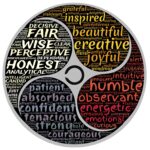With the challenges we all now face in the global economy, many people feel pressure to work harder and put in longer hours at work. That commitment may enable them to keep their jobs or maintain a certain lifestyles, but at what cost? In my consulting practice, I have seen a rise in stress levels, unhappiness, and family conflict among businesspeople with whom I work. Clearly, the lives of many businesspeople are out of balance.
While all businesspeople have to do what is necessary to survive this economic crisis, a short-term focus can take a toll that isn’t beneficial in the long run. The ability to maintain some semblance of work/life balance is essential for both immediate functioning and long-term health and well-being.
What is Balance?
I think of work/life balance as being like a healthful and delicious meal. To create such a meal you must have the right combination of ingredients in just the right amounts. I believe there are six essential ingredients in work/life balance: personal, physical, professional, social, spiritual, and avocational. Which of these ingredients and their quantities you need is up to you. But if one or more of the ingredients that are important to you aren’t present in your life, your life can’t be balanced.
Understanding Imbalance
Imbalance occurs when you have too many or too few ingredients, or the wrong combination of ingredients, in your life. The causes of work/life imbalance can include work demands, neglect of your other needs, a busy life, lack of awareness, success, and loss of perspective.
The consequences of imbalance can be dramatic and impact every area of your life. You can experience psychological and physical stress, a decline in work performance, ill health, family discord, life dissatisfaction, and even “Crackberry” addiction (an overdependence on your smartphone). The symptoms should also warning signs to you. If you’re experiencing these reactions, a red flag should be alerting you to step back and take a look at what’s happening to your life.
A variety of conflicts can arise in your life due to work/life imbalance. You may experience guilt for not spending enough time with your family. You may also feel an opposing guilt of not devoting enough time to work. You may miss participating in personal and social activities that are important to you. And your relationships with your family and friends may suffer.
Perspective on Balance
Before you can begin to take active steps to create more work/life balance, it’s important to gain a broader perspective on the role that it plays in your life. Balance isn’t really the goal here. The ultimate goal is well-being, which I define as coming from physical health, healthy relationships, rewarding work, and meaning and happiness in your life. Balance plays perhaps the central role in well-being because, without balance, all of the other contributors to well-being are jeopardized.
You have two goals in striving for work/life balance. First, you must recognize that absolute balance may simply not be possible at the present time. The realities of the current economic situation may require imbalance in your life to maintain your professional position. With that in mind, your immediate goal is to find balance in the imbalance. In other words, seek out small morsels of balance in your necessarily imbalanced life. This could mean a run at 4 am or reading the newspaper for 20 minutes at lunch, or having a meal with your family in the evening. The key is to do something of personal meaning to you every day, for however short a time it might be. This brief nourishment of the soul goes a long way to maintaining a modicum of balance in an otherwise imbalanced life.
Second, strive for true balance over time. Look into the future and ask yourself what you need to do to find that deep and lasting balance in a few months or a few years. Perhaps you will choose to sacrifice short-term balance for long-term equilibrium. Or you may decide that life isn’t worth waiting for and assert balance into your current life. In either case, make a deliberate decision about balance in your life rather than just being swept away by the torrent of life.
A final thought to put balance in perspective. Time is the most important resource you have because it is nonrenewable. The clock is ticking equally fast for all of us and it can’t be stopped or turned back. Because time is such a valuable commodity, it should be spent wisely. You should spend your time doing those things that you value most. As a result, time deserves your careful consideration. Because, as the saying goes, “On your deathbed, you’re not going to wish you spent more time at the office.”
Foundation of Balance
The first step in moving toward greater balance in your life is to define balance for yourself. What ingredients do you value most? Which ingredients are currently too overpowering and which are not even in the mix? Then, what is reasonable balance for you at the present time? How much time and energy can you realistically devote to each part of your life? Next, evaluate where you are now and where you want to be so you can see clearly how far you have to go and what you need to do to get there.
If you have a spouse or family, the process of creating work/life balance must be inclusive because there are more needs that must be considered than your own. The key is for everyone involved to communicate their needs, be mutually respectful and understanding, and to come to an arrangement that best meets everyone’s needs (while recognizing that compromises will likely need to be made).
Process of Creating Balance
To conclude, the process of creating balance in your life involves the following:
- Understand what balance really is.
- Explore balance in your life.
- Make balance a value and priority.
- Communicate.
- Make deliberate decisions about balance in your life.
- Take action.
- Persist.
- Be flexible.
In the November issue of Prime Business Alert! I’ll discuss practical strategies you can use in your work and personal lives to create more work/life balance. Until then, don’t fall off life.






